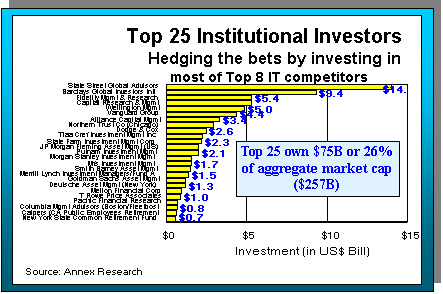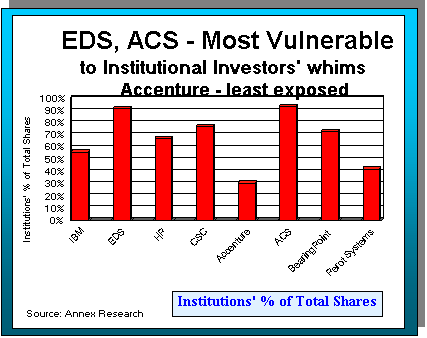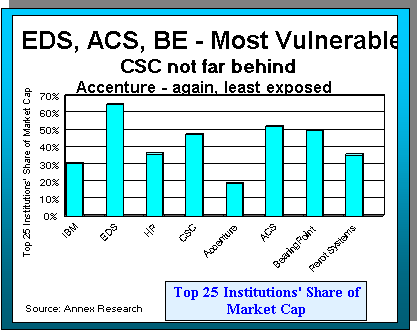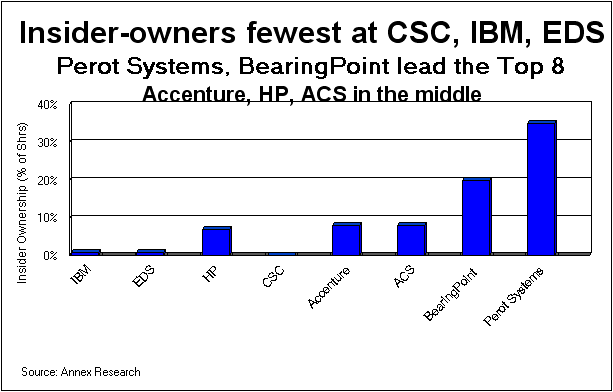
Home |
Headlines | Annex Bulletins
| Index 2004 | About
Founder | Search | Feedback
| Clips | Activism
| Client quotes | Workshop | Columns
| Subscribe ![]()
The copyright-protected information contained in the ANNEX BULLETINS and ANNEX NEWSFLASHES is part of the Comprehensive Market Service (CMS). It is intended for the exclusive use by those who have contracted for the entire CMS service.
An OPEN Client Edition
![]()
INDUSTRY TRENDS
Analysis of Institutional Ownership of
Top 8 IT Services Vendors’ Shares
Hedging the Bets
Top 25 Institutions Account for One Quarter of
Top 8 IT Firms’ Market Cap; EDS, ACS, BearingPoint - Most Vulnerable to
Institutions’ Whims
PHOENIX, March 5
– When IBM Global Services (IGS) beats out EDS and Hewlett Packard
Services (HPS), for example, in a highly contested global
“megadeal,” the CEOs of State Street, Barclays, Fidelity or Capital
Research must be wringing their hands in glee.
When HPS beats out EDS and IBM, on the other
hand, in a highly contested global “megadeal” (such as at Procter
& Gamble or at Nokia,
for example), the CEOs of State Street, Barclays, Fidelity or Capital
Research must be again wringing their hands in glee.
That’s because these four companies are the
four largest institutional shareholders of the Top 8[1]
global IT services firms. Each
has a vested interest in each of the three IT competitors mentioned to
the tune of billions, or hundreds of millions of dollars.
So even when some IT vendors lose, some of
their owners win. That’s
called hedging the bets. That’s one of the conclusions we reached
after an exhaustive study of the Top 25 institutional shareholders in
the Top 8 IT services providers. In the aggregate, some of Wall Street’s
biggest movers and shakers accounted for about 26% of the Top 8 IT
companies’ market cap ($75 billion out of $257 billion – as of Sep
30, 2003, the latest date for which such data is available).
And it’s an incestuous world out there on Wall Street… Incestuous World Take Capital Research, for example, the fourth
largest institutional owner of the Top 8 IT services companies, with
about $5.3 billion of total capital invested.
About 45% of that total, or $2.4 billion as of Sep 30, 2003, was
its IBM bet. At
the same time, however, Capital Research also owned $1.7 billion (a 33%
bet) of HP, and $1.1 billion (a 20% bet) of EDS.
It even owned $153 million (a 3% bet) of Computer Sciences Corp.
(CSC), just for good measure, we suppose.
But it did not own any stock in Accenture, Affiliated
Computer Services (ACS), BearingPoint (BE) or Perot Systems (PER). (By the way, Capital Research is by far the
largest EDS owner with 11% of total shares… see the chart and Top
25 Table for more details). Similar stories about hedging the bets emanate
over and over again from the Top 25 institutions portfolios.
It’s just that the ownership and proportions vary. State Street Global Advisors, for example, the
largest institutional shareholder in IT firms with over $14 billion at
stake, is heavily concentrated in IBM, of which it is the largest
shareholder (it owned $11.4 billion, or 7.5% of total IBM shares
outstanding). Big Blue
accounts for 81% of State Street’s Top 8 portfolio.
But State Street also owned a piece of every Top 8 IT company
except for Accenture. Ditto re. Fidelity Management, the third
largest institutional investor, whose stake in the Top 8 amounted to
$5.4 billion as of Sep 30, 2003. It
also shunned Accenture while investing in the other seven competitors. In fact, Accenture has the lowest percentage
of institutional shareholdings of all Top 8 IT services firms (31%,
versus the average of 67%). EDS,
ACS – Most Vulnerable, Accenture Least Is that a blessing or a curse?
We are inclined to think it is the former.
Lower institutional ownership means that the Accenture shares are
less susceptible to the Wall Street big shots’ whims and capricious
moves that are often driven by gossip rather than company fundamentals. High institutional shareholdings, on the other
hand, can mean greater stock price volatility. EDS, which is 92% owned by institutions, found that out in
September 2002, for example, when its shares plummeted following
disappointing news (see “EDS
Issues Warning,” and “Wall
Street Legal Vultures Descend Upon EDS”).
And
even this year, EDS’ shares were the only ones among the Top 8 to
decline (down 2% since Sep 30, 2003).
The market cap of the Top 8 competitors’ increased by about 11%
on average during the same time frame (Accenture is up 5%, IBM 9%, HP
17%, for example, while BearingPoint and Perot Systems have surged 32%
and 40% respectively). ACS is just as vulnerable as EDS to
institutional investors’ whims. The
latter own about 94% of that company’s outstanding shares.
CSC’s and BearingPoint’s institutional shareholdings are also
relatively high – 77% and 73% respectively (the average for the Top 8
is 67%). IBM and HP are in the middle of the Top 8 IT
pack, with 56% and 67% of their shares respectively owned by
institutions. Accenture and
Perot Systems are bringing up the rear, with 31% and 42% respective
institutional ownership. In terms of the institutions’ shares of the
Top 8 market cap, EDS, ACS and BearingPoint are at the point with 65%,
52% and 50% shares respectively. CSC
isn’t far behind, either, with a 48% market cap share attributable to
institutions.
Insiders
Putting Money Where Mouth Is? Perot Systems and BearingPoint also have the
highest insider shareholding percentages (35% and 20% respectively).
Accenture, ACS and HP are this time in the middle of the pack,
with 8%, 8% and 7% respective insider share ownership, while CSC, IBM
and EDS bring up the rear (almost zero and 1% respectively).
To the extent that management and
shareholders’ interests are best served when they are closely aligned,
it seems a good idea for insiders to own more than just a token share of
the company. CSC, IBM and
EDS stand out among the Top 8 in the opposite direction.
Their executives seem to be incented the least to identify with,
and act in their passive shareholders’ interests.
No wonder some of them
are acting as if they are not putting their money where their mouth is
(IBM - stock
options and buybacks;
EDS - nepotism,
for example). And that’s
another reason for institutional investors’ hedging of their bets.
Happy
bargain hunting! Bob
Djurdjevic [1]
The “Top 8” IT services companies would, of course, include Cap
Gemini. But this company’s
shares are traded on the Paris Bourse, and the data about institutional
shareholdings is not readily available. For additional Annex Research reports, check
out... 2004
Global



![]()
2004 IT: Cap Gemini: Another, Smaller Loss (Feb 2004); CSC: Good Quarter Gets Boos (Feb 2004); EDS: " Hot Air Jordan" Flaunts Flop as Feat (Feb 2004); IT Industry: Whither Goeth It? (Jan 2004); Cronyism Is Alive and Well at EDS" (Jan 2004)
2003 Global: "A Passage to India" (July 22), Exodus from Equities (May 27), Money CAN Buy Longer Life (May 6), Global Investments Plummet (Jan 23)
A selection from prior years (Global): Greed Bites Back (Nov 29, 2002), Salomon/Gutfreund: Wall Street Casino (June 21, 2002), "From a Nation of Producers, to a Nation of Gamblers " (June 23, 1999), "When Will Wall Street's Bubble Burst?" (1998), "Wall St.'s Conquest of America" (1998), THE GREAT AMERICAN HOOVER (1997)
![]()
Or just click on  and use "financial engineering" or similar
keywords.
and use "financial engineering" or similar
keywords.
|
Volume XX, Annex Bulletin 2004-07 Bob Djurdjevic, Editor P.O. Box 97100, Phoenix, Arizona 85060-7100 |
![]()
Home | Headlines | Annex Bulletins | Index 2004 | About Founder | Search | Feedback | Clips | Activism | Client quotes | Workshop | Columns | Subscribe